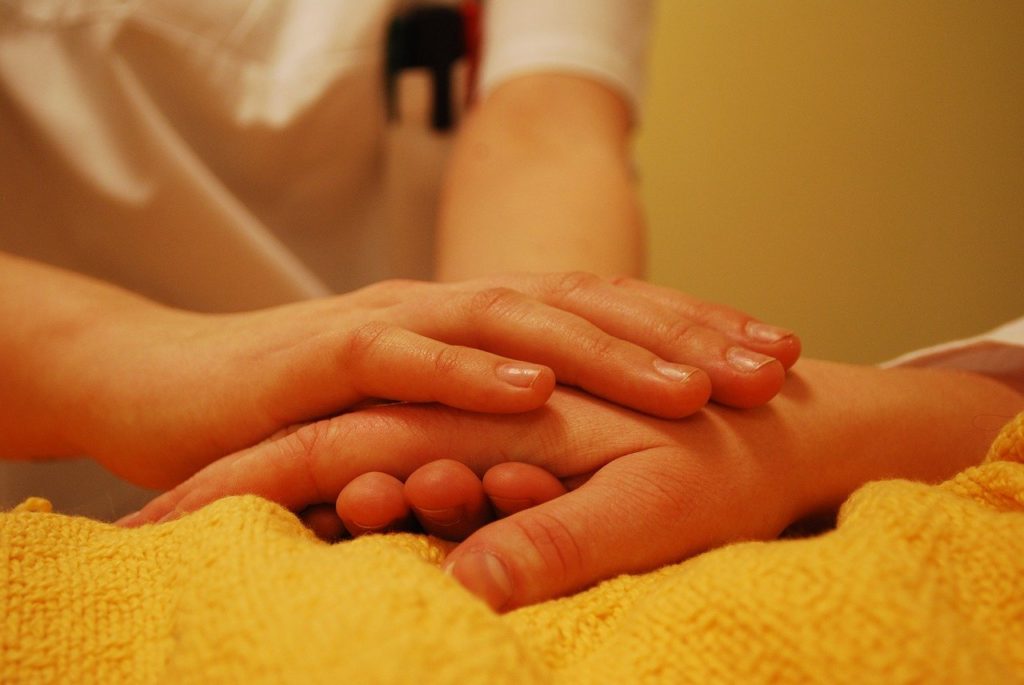Why Choose Hospice Care?
Hospice is end-of-life care for patients and their families, focused on controlling pain and symptoms. Hospice care begins in the final stage of life. Hospice care is a Medicare/Medi-Cal benefit. Hospice focuses on caring, not curing. In most cases, care is provided in the patient’s home, but may also be provided in freestanding hospice centers, hospitals, nursing homes, and other long-term care facilities. Hospice services are available to patients with any terminal illness of any age, religion, or race.
Frequently Asked Questions
What is hospice?
Hospice is a special concept of care designed to provide comfort and support to patients and their families when a life-limiting illness no longer responds to curative treatments. Hospice care tries to manage symptoms; its primary goal is to improve the quality of a patient’s life by offering comfort and dignity.
Who will pay for hospice?
Hospice services are covered by Medicare, Medi-Cal, and private insurance. Admission to Hospice is based on the patient’s needs, rather than the ability to pay. Hospice care includes pain medication, durable medical equipment, supplies, and personal care at no cost through Medicare or Medi-Cal. Most health plans and HMOs also include hospice coverage. An individualized plan of care is established by the patient, family, and our skilled professionals.
Hospice is only for cancer patients?
Any person facing the advancing stages of any terminal illness is eligible for hospice care. Hospice care is appropriate when the following conditions are met:
- The physician thinks the patient will live six months or less if the disease runs its normal course.
- The patient, family, and physician agree and understand that the focus is on comfort (pain control and symptom management), not cure.
About 55 percent of hospice patients are cancer patients, but an ever-increasing number of patients with other diseases (including Alzheimer’s, ALS, heart disease, chronic obstructive pulmonary disease, and AIDS) receive hospice care.
What are the different levels of hospice care?
Most patients begin with routine home care. Usually, a family member provides day-to-day care. Hospice provides the equipment, medications, and information that caregivers need to fulfill their duties.
- Our Registered Nurses make regular home visits to assist with pain and symptom management, and our Home Health Aides, Social Workers, and other team members visit as needed. Nurses are also available anytime by phone to help patients and caregivers through a crisis. For in-home patients who require skilled nursing care to control their pain and other symptoms, our Registered Nurses and Home Health Aides stay with the patient for longer periods of time, day or night, as needed.
- Even the most committed caregivers occasionally need a break. St. Mary’s Hospice can offer them a break through respite care, which is often offered in up to 5-day periods. During this time, patients will be cared for in a hospital setting, hospice facility, or in a nursing home. Families can plan a mini-vacation, go to special events, or simply get much-needed rest at home while your loved one is cared for in an inpatient setting.
- Some patients require more involved care than can be offered in a home setting. St. Mary’s Hospice also supports those who are hospitalized or those in an extended-care facility. The hospice can arrange for inpatient care and will stay involved in patients’ care and with their families. Patients can go back to in-home care when they and their families are ready.
- Sometimes a patient has a medical crisis that needs close medical attention. When this happens, we offer short-term care that is available in patient’s home when symptoms cannot be managed by the usual caregiver. The hospice provider determines when such care is needed and for how long. Depending on the needs of the patient, he or she might remain at home with our team members providing round-the-clock care or be hospitalized for pain or symptom management following in-home crisis care. When the crisis is over, the patient returns to routine home care.
The interdisciplinary team coordinates and supervises all care 7 days a week, 24 hours a day. The team is responsible for making sure that all involved parties share information. This may include the inpatient facility, the home care agency, the doctor, and other community professionals, such as pharmacists, clergy, and funeral directors. You and your caregivers are encouraged to contact your hospice team if you are having a problem, any time of the day or night. There is always someone on call to help you with whatever may arise. Hospice care assures you and your family that you are not alone and help can be reached at any time.
What is a life limiting illness?
The term ‘life-limiting illness’ is used to describe a chronic disease or condition that doesn’t respond to curative treatments, leading to a terminal diagnosis. This definition is inclusive of illnesses of both a malignant and non-malignant nature. A life-limiting illness might be expected to shorten an individual’s life. Having a life-limiting illness qualifies a patient for hospice.
Cancer is the most common such illness. Others include:
- ALS
- Alzheimer’s
- Cancer
- Cardiac Disease
- Dementia
- HIV/AIDS
- Liver Disease
- Multiple Sclerosis
- Parkinson’s
- Pulmonary Disease
- Renal/Kidney Disease
- Stroke
Hospice may also be appropriate for those patients who have several conditions that, when considered together, leave their health fragile and shorten their life expectancy.
How are pain and symptoms managed?
Even when nothing more can be done to cure an illness, much can still be done to ease a patient’s pain and symptoms. Pain control is one of the central goals of hospice care. Most patients and families who use hospice services expect that the hospice will make every effort to relieve the pain which afflicts their loved one. Using hospice services will, in most cases, assure that the patient receives the pain medications needed to control his pain: the hospice Interdisciplinary Team and the hospice RN case manager are focused on making sure the patient is comfortable.
The team at St. Mary’s Hospice are experts in pain and symptom management. Our Interdisciplinary Team will work with patients and their caregivers to understand the sources of pain and find treatments that provide real relief.
Can Hospice services be provided at home?
St. Mary’s Hospice provides services at:
- Private residence
- Skill Nursing Facilities
- Boarding Care Facilities
- Hospital setting



